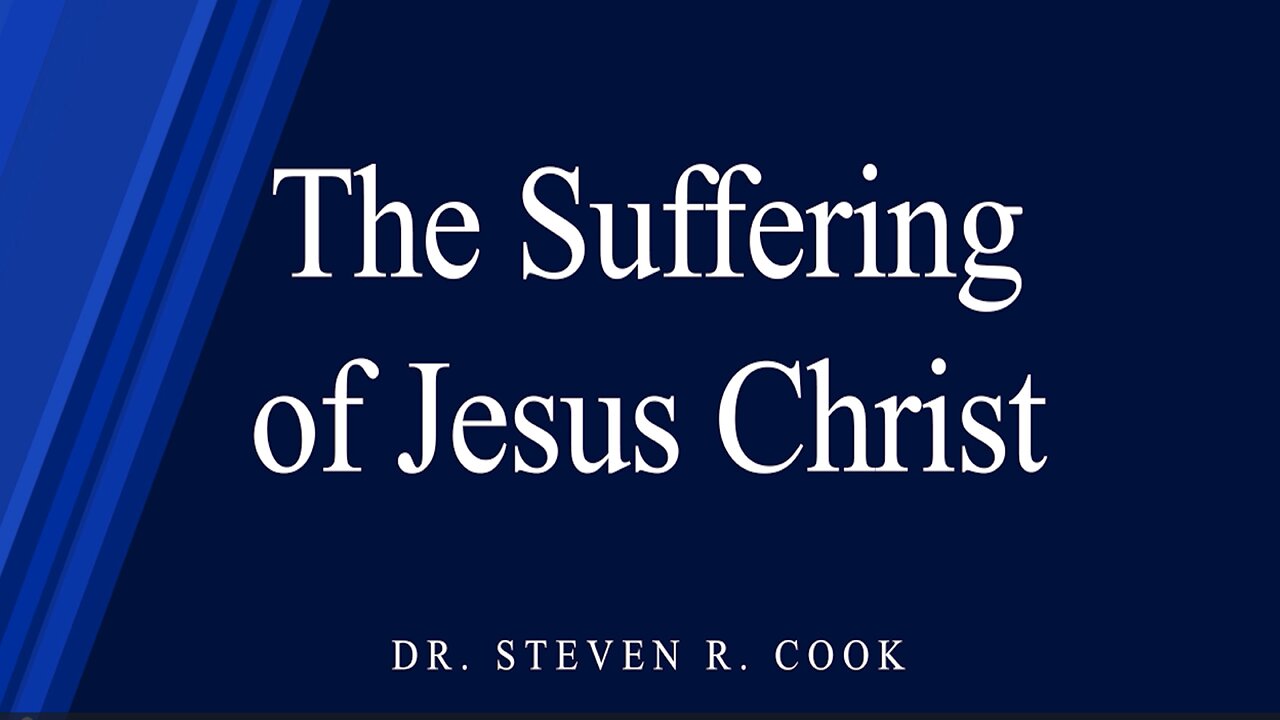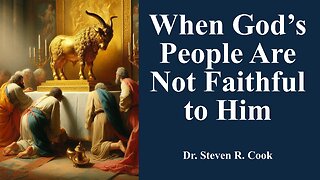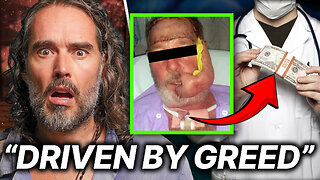Premium Only Content

The Suffering of Jesus Christ
When God the Son added perfect humanity to Himself, this enabled Him to experience suffering and death with, and on behalf of, humanity. The suffering of Christ may be viewed in at least two ways: 1) His suffering during His time on earth prior to the cross, and 2) the suffering of the cross. As the God-Man, Jesus was perfectly holy in all His thoughts, words, and actions. Such perfect holiness brought with it a special form of suffering in this world that the rest of us could never know, since we are capable of yielding to the pressures of sinful temptation. When the time of His death was nearing, Jesus told His disciples “that He must go to Jerusalem, and suffer many things from the elders and chief priests and scribes, and be killed, and be raised up on the third day” (Matt 16:21; cf., Mark 8:31; Luke 9:22). It’s noteworthy that Jesus said His suffering, dying, and resurrection were things that “must” happen to Him. The use of the Greek verb dei (δεῖ) here denotes divine necessity, which meant it was the will of God the Father that these things happen to Christ. Thomas Constable notes, “Jesus said that it was necessary (Gr. dei) for Him to go to Jerusalem. He had to do this because it was God’s will for Messiah to suffer, die, and rise from the dead. He had to do these things to fulfill prophecy (Isa 53; cf. Acts 2:22–36).” The absolute necessity of Jesus’ death on the cross further emphasizes our helplessness to save ourselves, for if our salvation could have been secured by any other means, then the death of Christ would have been unnecessary. While in the Garden of Gethsemane, Jesus prayed to God the Father, saying, “My Father, if it is possible, let this cup pass from Me; yet not as I will, but as You will” (Matt 26:39). In His humanity, Jesus struggled to face the cross, understanding the scope of what it meant and the agony associated with it. Jesus prayed a second time, saying, “My Father, if this cannot pass away unless I drink it, Your will be done” (Matt 26:42). The reference to the “cup” speaks of the suffering of the cross. John A. Witmer states, “In the Old Testament a ‘cup’ sometimes symbolized wrath (Jer 25:15), and so Jesus was aware that His coming death meant He would bear the wrath of God the Father against sin. Though Christ had no sin (2 Cor 5:21), He bore the sins of the world on Himself (1 Pet 2:24). Thus He was made ‘a curse for us’ because of His being hanged on a tree (Gal 3:13).” While on the cross, Jesus cried out, “My God, My God, why have You forsaken Me?” (Matt 27:46). This was the cry of Jesus from His humanity. Peter tells us that Jesus “Himself bore our sins in His body on the cross” (1 Pet 2:24). Peter’s reference to Jesus’ “body” indicates humanity, not deity. Sin cannot be imputed to deity. Humanity can bear sin. It was while Jesus was on the cross that He bore the wrath of the Father as He died in our place and bore the punishment that rightfully belongs to us. And the Spirit sustained Jesus’ humanity while He bore our sins. Robert G. Gromacki states, “God the Son incarnate suffered and died. The Father did not suffer and die. Nor did the Holy Spirit suffer and die, even though He filled Christ when the Savior suffered and died.” The suffering and death of Jesus on the cross was salvific, as Jesus was made “sin on our behalf” (2 Cor 5:21). Mark wrote, “When the sixth hour came, darkness fell over the whole land until the ninth hour. At the ninth hour Jesus cried out with a loud voice, ‘Eloi, Eloi, lama sabachthani?’ which is translated, ‘My God, My God, why have You forsaken Me?’” (Mark 15:33-34; cf., Matt 27:45-46; Luke 23:44-46). Concerning this moment on the cross, Witmer states, “It was at this point, as Jesus bore the sin of the world, that God, the Judge of sin, turned away from Jesus Christ, His incarnate Son, the Sin-bearer, as far as the personal consciousness of Jesus was concerned.” But there is some mystery at work here, for God the Father could not forsake God the Son, as a separation within the Trinity is not possible. Yet, somehow, the humanity of Christ—not His deity—was forsaken at the time of the judgment on the cross, otherwise the words of Jesus would be meaningless. But Jesus’ suffering and death did happen, and it was His time on the cross that brought about our salvation; a salvation that is applied to us at the moment we trust in Christ. Even after Jesus’ resurrection, Jesus said to the two disciples on the road to Emmaus, “Was it not necessary for the Christ to suffer these things and to enter into His glory?” (Luke 24:26). In the book of Acts, Luke records that Jesus “presented Himself alive after His suffering” (Acts 1:3). Peter said, “the things which God announced beforehand by the mouth of all the prophets, that His Christ would suffer, He has thus fulfilled” (Acts 3:18). And Paul reasoned “from the Scriptures, explaining and giving evidence that the Christ had to suffer and rise again from the dead” (Acts 17:2b-3; cf., Acts 26:23).
-
 10:12
10:12
Thinking on Scripture
1 month agoWhen God’s People Are Not Faithful to Him
361 -
 8:22
8:22
Russell Brand
15 hours agoThey want this to happen
192K392 -
 2:06:43
2:06:43
Jewels Jones Live ®
1 day ago2025 STARTS WITH A BANG! | A Political Rendezvous - Ep. 104
106K38 -
 4:20:41
4:20:41
Viss
15 hours ago🔴LIVE - PUBG Duo Dominance Viss w/ Spartakus
87.1K10 -
 10:15:14
10:15:14
MDGgamin
18 hours ago🔴LIVE-Escape From Tarkov - 1st Saturday of 2025!!!! - #RumbleTakeover
67.8K2 -
 3:54:19
3:54:19
SpartakusLIVE
14 hours agoPUBG Duos w/ Viss || Tactical Strategy & HARDCORE Gameplay
80.3K1 -
 5:54:54
5:54:54
FRENCHY4185
15 hours agoFRENCHY'S BIRTHDAY BASH !!! THE BIG 40 !!!
87.2K3 -
 1:23:33
1:23:33
Michael Franzese
23 hours agoThings to look forward to in 2025
105K62 -
 3:23:02
3:23:02
I_Came_With_Fire_Podcast
1 day agoDefeating VICTIMHOOD: Advocacy, Resiliency, and Overcoming Abuse
108K19 -
 2:00:56
2:00:56
Game On!
1 day ago $10.60 earnedNFL Experts debate if Joe Burrow will make HISTORY in Week 18!
120K16